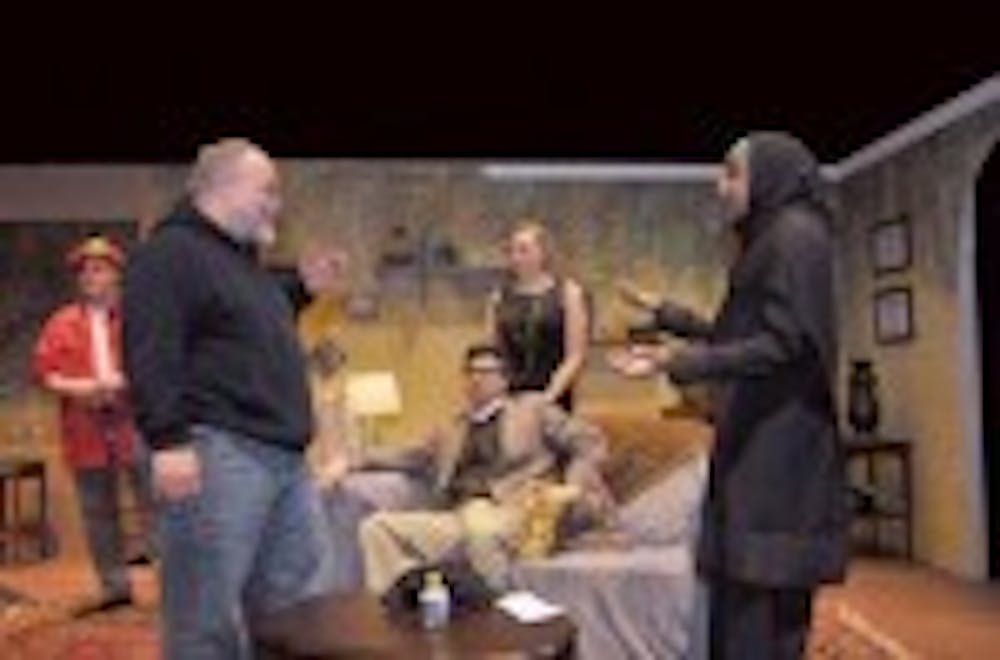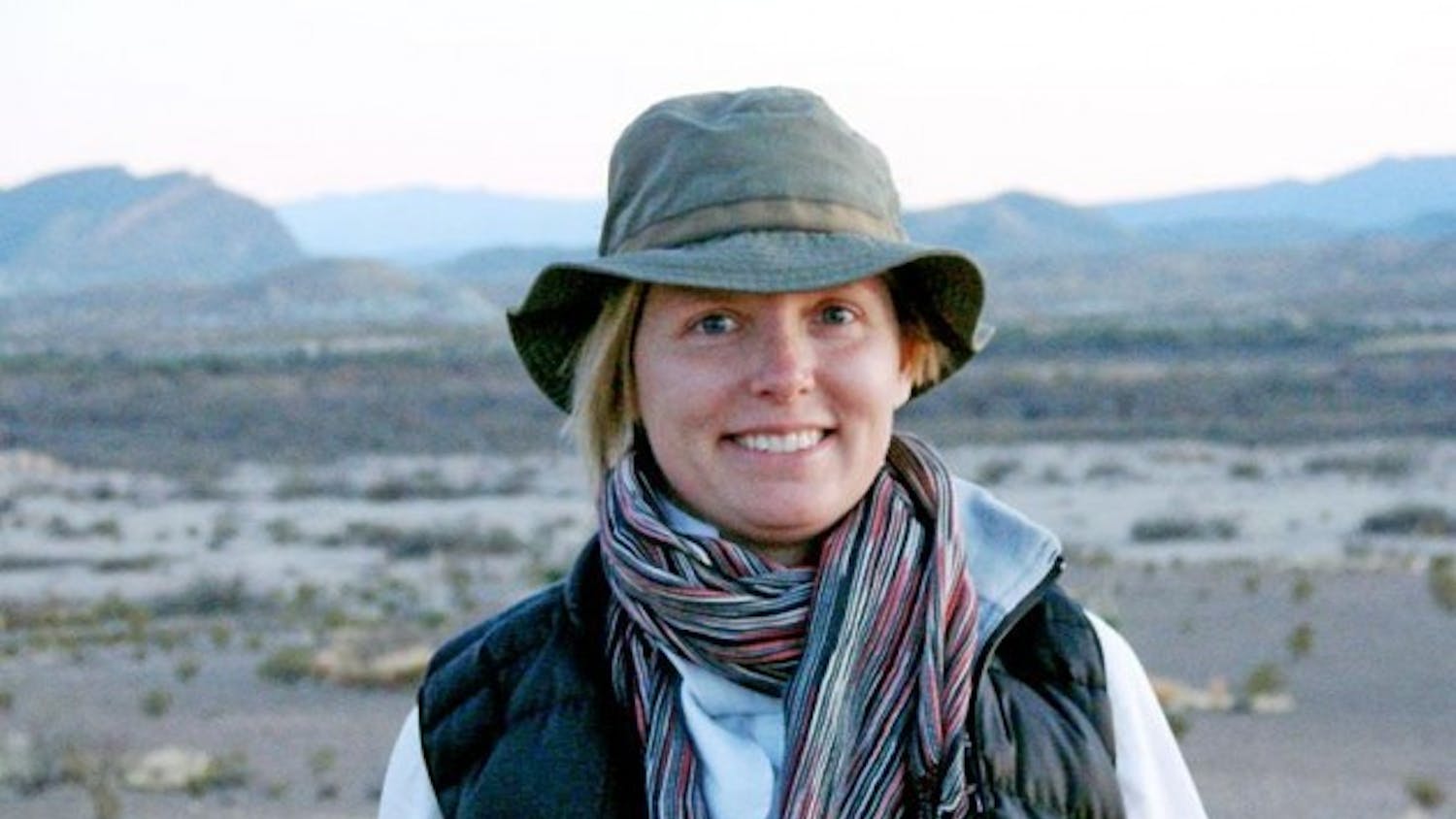Stephen McKinley Henderson found his third family in theater.
His mother - a single parent who had two children in her teens - was unable to support him herself and gave him to another family.
The reason: poverty.
Henderson, now 63, had to cross state lines on the bridge from Kansas into Missouri to see his mother and siblings, which eventually included two sisters.
Henderson, who was the only child to the couple that raised him, craved a greater sense of belonging. He found his answers on the stage.
And in theater, he'd eventually find great success, a Tony nomination for his role in Fences, an unforgettable relationship with its Pulitzer-winning playwright August Wilson and work with renowned actors in theater and film.
Since 1987, Henderson, a professor in UB's Department of Theater and Dance, has split his time between the stage and the classroom. His most recent acting credits include the Oscar-nominated film Lincoln and Aaron Sorkin's HBO show The Newsroom. He is currently in the midst of directing UB's production of Forgiving John Lennon. But Henderson's life fits together in the realm of theater; he believes that every experience he's encountered prepared him for the next one.
Michael Dempsey, a sophomore theater performance major who is in Forgiving John Lennon, pointed out there are celebrities and there are artists and Henderson, whom he described as humble, is an artist.
"The first day we had rehearsal, we had a table reading," Dempsey said. "When he walked in, he sat down and said, 'Yes, I was in Lincoln. Yes I was Tony nominated, but let's never talk about that ever again.'"
Henderson jokes, "It takes 20 years to become an overnight success." He put all that time in and then some.
But Henderson understands the value of a journey - it is an actor's fuel.
"So much of your life is the only pallet of colors you have to dip into; you have got to paint with your experiences," he explained.
He can captivate a crowd on stage or "he can hold you spellbound" with stories of his past experiences, according to friend, colleague and former UB professor Anna Kay France.
He lives as a perpetual storyteller, both as a director and actor.
"I never started acting in order to be in a movie - I never thought I'd be in a movie. I had no idea," Henderson said. "I was doing it when I did it because of the stories."
While Henderson has spent his entire career being the vehicle to tell others' stories - acting alongside greats like Denzel Washington and Daniel Day-Lewis - he has a compelling story of his own.
"I knew my family. I just didn't live with them because it was just too much for [my mother] at that time," Henderson explained.
After 12 years, his mother's life began to stabilize in Missouri, but at that point, Henderson had built his life in Kansas. He got used to living with the couple that took him in and visiting his siblings on the weekend. Despite the unconventional situation, he still built a strong bond with his older brother.
His brother, five years his senior, lost his hearing as an infant. But Henderson glows on the mention of one of his life's biggest influences.
"He was my big brother," Henderson said with a thoughtful assertiveness. "It didn't really mean that much to me that he was deaf because he seemed to be so astute about other things."
He fondly remembered the trips the two would take to the movies and recounted how others didn't see the brilliance in his brother quite like he could.
Henderson finished junior high and high school in Kansas but always wanted to be with his brother and sisters - it's that desire to belong that made him feel so comfortable in theater. He wanted to be a part of something but let out a soft laugh as he admitted he didn't have the athleticism to join a sports team - those skills went to his brother and later his son.
But in school, a knack for poetry grew into a passion for the arts and acting.
His office is covered with playbills and posters from an extensive career. A 1993 plaque celebrating his direction of a one-man play about Muhammad Ali in the London Olympic Arts Festival hangs on his back wall. Henderson, the soft-spoken man with a rhythmic voice, had a warm smile creep over his face as he recounted introducing his family to the esteemed boxer, who came to the play's London premiere.
He admits his wife and son get more out of the movie premieres and Broadway show openings than he does.
"That's when I like it because they know what I used to do; they know I do it because I love it," Henderson said. "It's great to see them enjoy it, but I like to get to work. I like the work."
Henderson stresses the value of "the work" to his students. When someone in his cast of Forgiving John Lennon asked him why he didn't go to the Oscars - even though a clip he was in was shown in the telecast - Henderson responded: "it's about the work; it's not about who I am," according to Dempsey.
And Henderson has been working for decades. Dempsey said while actors with the same credentials may have an ego, Henderson is the "most humble and modest person [he's] ever worked with in theater."
Henderson was part of The Julliard School's first acting program in 1968, after studying at Lincoln University in Missouri. He spent two years in New York at Julliard before deciding to go back South to study at the North Carolina School of the Arts. He went on to graduate school at Purdue University, where he is now a distinguished alumnus.
Throughout his college experiences, he became classically trained and educated about the black theater movement and worked directly with the Black Panther Party, an African-American socialist organization. He also worked to with an organization to ensure junior high school students "[knew] about history and art and [knew] the context of their lives and where they were being born in the timeline after slavery."
To Henderson, it was like everything in his life prepared him to work with Wilson. Many within the theater circuit note Wilson's works to be expansive and poetic, articulating the plight of African Americans in the post-slavery United States.
Henderson's culture melded with his experiences and made Wilson's plays the perfect fit.
"[Things seem to fit together] when you look back, but at the time, you don't see the fit," Henderson said. "There's a whole lot of work time, there's a whole lot of different stuff there, but when you look back, you see the inevitability of it. But at the time you're living it, you don't see that because you don't know what's next."
What wound up being "next" for Henderson was becoming a part of Wilson's fellowship of actors. The exclusive group is known for its portrayals within Wilson's 10-play series known as "the Pittsburgh Cycle," which chronicles the struggles of African Americans decade by decade.
Henderson's relationship with Wilson stands out to him as one of the most fulfilling times in his career. The two worked together for eight years; Henderson's first Broadway show was Wilson's King Hedley II.
Wilson passed away in 2005, but it was Henderson's role as Jim Bono in the 2010 revival of Wilson's Fences that got Henderson his Tony nomination for best performance by a featured actor in a play.
"When you get nominated for a Tony, you realize just how far you've come - it really sort of justifies a lot of people who had faith in you, a lot of the folks who helped you," Henderson said. "It makes you grateful; it humbles you. But you really do realize how few people get that kind of endorsement."
Henderson said he could have easily gone his whole life without doing Broadway and not getting that break. He spent years in regional theater, bouncing between a few select cities working as a company actor.
In Fences, he worked with Denzel Washington andViola Davis, who brought in people from Hollywood. The exposure helped Henderson get TV roles and a big role in the 2011 comedy Tower Heist with Ben Stiller and Eddie Murphy.
Tony Kushner, who wrote the screenplay of Lincoln, saw Henderson act in multiple Wilson plays. Again, Henderson felt the pieces of his past experiences coming together.
"Some things come and you just know 'I'm just supposed to be a part of this; that's just it,'" Henderson said, drawing parallels to how it was like his "fit" within Wilson's plays.
Kushner personally asked Henderson to play the role of William Slade, a historical freeman who was a close friend of Lincoln's. When Henderson walked on set, Daniel Day-Lewiswas so much in the realm of his character he greeted Henderson with, "Oh, Mr. Slade, so good to see you again."
For Henderson, being told by someone, "I think we need you on this" is a huge honor, no matter how big or small the role, he said.
But while other actors were decked out and walking the red carpet, Henderson spent Oscar night at rehearsal with the Forgiving John Lennon company.
Dempsey said Henderson is different from any other director he has ever worked with because he pushes his students to create characters and understand the choices their characters would make.
"What he stresses is, 'acting is not about getting it right; it is about getting it true," Dempsey said.
Live theater honesthe human experience in Henderson's eyes; it's powerful and raw. He views each piece of theater as a journey.
"I have to really focus, really have to take this journey with [the actors], but after I take the journey, I feel somehow more human," Henderson said. "I feel more at home being a human, realizing just how we're all survivors. We're surviving things and I think that's it. I think the theater exists to reveal the capacity of the human spirit."
And Henderson is pleased to share the gifts he finds in theater with his students. France described him as a "generous spirit" and said he cares deeply and passionately about all his students, former and current.
France is thrilled to watch Henderson's continued success and feels it provides invaluable experience to the university.
Henderson admits some people can't understand why he would choose to spend a semester each year teaching and not acting full time. They ask him, "Well, if you're really such a good actor, what are you doing here?" He said those people "don't think much of where they are, so they don't know why you're there."
Henderson remembers what it was like to be back in Kansas where he found his home on the stage and discovered his family. He remembers what it was like to have people tell him, "I think you're good enough to leave Kansas and go make a living at this."
He hopes to do the same for his students. He lives to pay it forward.
Emails: news@ubspectrum.com





